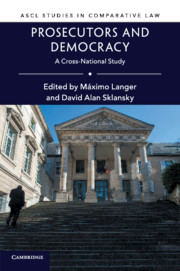10 results
Epilogue
-
-
- Book:
- Prosecutors and Democracy
- Published online:
- 13 October 2017
- Print publication:
- 26 October 2017, pp 276-299
-
- Chapter
- Export citation
Contributors
-
- Book:
- Prosecutors and Democracy
- Published online:
- 13 October 2017
- Print publication:
- 26 October 2017, pp v-vi
-
- Chapter
- Export citation
Index
-
- Book:
- Prosecutors and Democracy
- Published online:
- 13 October 2017
- Print publication:
- 26 October 2017, pp 300-338
-
- Chapter
- Export citation
Copyright page
-
- Book:
- Prosecutors and Democracy
- Published online:
- 13 October 2017
- Print publication:
- 26 October 2017, pp i-iv
-
- Chapter
- Export citation
Introduction
-
-
- Book:
- Prosecutors and Democracy
- Published online:
- 13 October 2017
- Print publication:
- 26 October 2017, pp vii-viii
-
- Chapter
- Export citation
Contents
-
- Book:
- Prosecutors and Democracy
- Published online:
- 13 October 2017
- Print publication:
- 26 October 2017, pp i-iv
-
- Chapter
- Export citation
10 - Unpacking the Relationship between Prosecutors and Democracy in the United States
-
-
- Book:
- Prosecutors and Democracy
- Published online:
- 13 October 2017
- Print publication:
- 26 October 2017, pp 250-275
-
- Chapter
- Export citation

Prosecutors and Democracy
- A Cross-National Study
-
- Published online:
- 13 October 2017
- Print publication:
- 26 October 2017
4 - Stealing Bill Stuntz
-
-
- Book:
- The Political Heart of Criminal Procedure
- Published online:
- 05 March 2012
- Print publication:
- 30 December 2011, pp 87-108
-
- Chapter
- Export citation
Police and Community in Chicago: A Tale of Three Cities. By Wesley G. Skogan. Oxford: Oxford University Press, 2006. Pp. 360. $35.00 cloth.
-
- Journal:
- Law & Society Review / Volume 42 / Issue 1 / March 2008
- Published online by Cambridge University Press:
- 01 January 2024, pp. 233-235
- Print publication:
- March 2008
-
- Article
- Export citation

